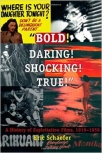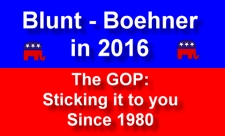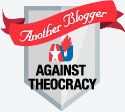I've posted before on the various attempts by historical revisionists to reframe the Vietnam War into something we could have "won" if it weren't for those goddam [insert favorite scapegoat here: the media, the war protesters, the "civilians" in charge of the military, the "doves" in Congress, etc etc etc] back in the good ole USA who "lost" the war for us.
Now I see there's yet another new book out playing that same tired old song. I won't identify it here because I don't want to give the fucker any additional web traffic or book sales out of my website, but I will refer you to an excellent piece by H.D.S. Greenway entitled Revisionist Approach to Vietnam, wherein he takes on the author of the book and, more importantly, the conclusions the author came to:
Today there is a school of thought that says Tet was a terrible defeat for the Communist Vietnamese, that it should never have caused us to flinch, that the war was basically won by 1972, and that if we had only stayed the course we would have won it. Henry Kissinger has said as much, whole generations of soldiers were told that, and, it seems, that many around President Bush believe it as well.Go read the whole thing. Greenway says the same thing as me, as thousands of other Vietnam veterans, all of whom were there and saw it for our own eyes, that the Vietnam War was never "winnable" in any real military sense.
When Iraq became the quagmire it is, I used to wonder how we could make the same mistake again so soon. But then I realized that Dick Cheney and Donald Rumsfeld were in the Oval office with President Ford when Saigon fell. Perhaps they, and the worshipers of American power, felt that, this time, we would get it right.
Just like Iraq.
Anyway, the Iraq War actually ended with the unfurling of that huge we-don't-know-who-did-it "Mission Accomplished" banner behind Prezdint Codpiece strutting around that carrier deck like a demonic smirking-chimp boy scout with a gym sock rolled up in his crotch. What's happened since then is nothing more than an illegal occupation of a sovereign nation. And the Iraqis want us out as badly as the Vietnamese did. Let's hope it doesn't cost us 57,000+ dead Americans before we finally get a clue and get the fuck out.











8 Comments:
Anyway, the Iraq War actually ended with the unfurling of that huge we-don't-know-who-did-it "Mission Completed" banner
Not many realize or accept that. But he (Bush) had what he wanted: The illegal occupation of one of "the axis of evil."
Hey Fans, why don't we ask one of the North Vietnam's top people what they thought?:
What did the North Vietnamese leadership think of the American antiwar movement? What was the purpose of the Tet Offensive? How could the U.S. have been more successful in fighting the Vietnam War? Bui Tin, a former colonel in the North Vietnamese army, answers these questions in the following excerpts from an interview conducted by Stephen Young, a Minnesota attorney and human-rights activist [in The Wall Street Journal, 3 August 1995]. Bui Tin, who served on the general staff of North Vietnam's army, received the unconditional surrender of South Vietnam on April 30, 1975. He later became editor of the People's Daily, the official newspaper of Vietnam. He now lives in Paris, where he immigrated after becoming disillusioned with the fruits of Vietnamese communism.
Question: How did Hanoi intend to defeat the Americans?
Answer: By fighting a long war which would break their will to help South Vietnam. Ho Chi Minh said,
"We don't need to win military victories, we only need to hit them until they give up and get out."
Q: Was the American antiwar movement important to Hanoi's victory?
A: It was essential to our strategy. Support of the war from our rear was completely secure while the American rear was vulnerable. Every day our leadership would listen to world news over the radio at 9 a.m. to follow the growth of the American antiwar movement. Visits to Hanoi by people like Jane Fonda, and former Attorney General Ramsey Clark and ministers gave us confidence that we should hold on in the face of battlefield reverses. We were elated when Jane Fonda, wearing a red Vietnamese dress, said at a press conference that she was ashamed of American actions in the war and that she would struggle along with us.
Q: Did the Politburo pay attention to these visits?
A: Keenly.
Q: Why?
A: Those people represented the conscience of America. The conscience of America was part of its war-making capability, and we were turning that power in our favor. America lost because of its democracy; through dissent and protest it lost the ability to mobilize a will to win.
Q: How could the Americans have won the war?
A: Cut the Ho Chi Minh trail inside Laos. If Johnson had granted [Gen. William] Westmoreland's requests to enter Laos and block the Ho Chi Minh trail, Hanoi could not have won the war.
Q: Anything else?
A: Train South Vietnam's generals. The junior South Vietnamese officers were good, competent and courageous, but the commanding general officers were inept.
Q: Did Hanoi expect that the National Liberation Front would win power in South Vietnam?
A: No. Gen. [Vo Nguyen] Giap [commander of the North Vietnamese army] believed that guerrilla warfare was important but not sufficient for victory. Regular military divisions with artillery and armor would be needed. The Chinese believed in fighting only with guerrillas, but we had a different approach. The Chinese were reluctant to help us. Soviet aid made the war possible. Le Duan [secretary general of the Vietnamese Communist Party] once told Mao Tse-tung that if you help us, we are sure to win; if you don't, we will still win, but we will have to sacrifice one or two million more soldiers to do so.
Q: Was the National Liberation Front an independent political movement of South Vietnamese?
A: No. It was set up by our Communist Party to implement a decision of the Third Party Congress of September 1960. We always said there was only one party, only one army in the war to liberate the South and unify the nation. At all times there was only one party commissar in command of the South.
Q: Why was the Ho Chi Minh trail so important?
A: It was the only way to bring sufficient military power to bear on the fighting in the South. Building and maintaining the trail was a huge effort, involving tens of thousands of soldiers, drivers, repair teams, medical stations, communication units.
Q: What of American bombing of the Ho Chi Minh trail?
A: Not very effective. Our operations were never compromised by attacks on the trail. At times, accurate B-52 strikes would cause real damage, but we put so much in at the top of the trail that enough men and weapons to prolong the war always came out the bottom. Bombing by smaller planes rarely hit significant targets.
Q: What of American bombing of North Vietnam?
A: If all the bombing had been concentrated at one time, it would have hurt our efforts. But the bombing was expanded in slow stages under Johnson and it didn't worry us. We had plenty of times to prepare alternative routes and facilities. We always had stockpiles of rice ready to feed the people for months if a harvest were damaged. The Soviets bought rice from Thailand for us.
Q: What was the purpose of the 1968 Tet Offensive?
A: To relieve the pressure Gen. Westmoreland was putting on us in late 1966 and 1967 and to weaken American resolve during a presidential election year.
Q: What about Gen. Westmoreland's strategy and tactics caused you concern?
A: Our senior commander in the South, Gen. Nguyen Chi Thanh, knew that we were losing base areas, control of the rural population and that his main forces were being pushed out to the borders of South Vietnam. He also worried that Westmoreland might receive permission to enter Laos and cut the Ho Chi Minh Trail.
In January 1967, after discussions with Le Duan, Thanh proposed the Tet Offensive. Thanh was the senior member of the Politburo in South Vietnam. He supervised the entire war effort. Thanh's struggle philosophy was that "America is wealthy but not resolute," and "squeeze tight to the American chest and attack." He was invited up to Hanoi for further discussions. He went on commercial flights with a false passport from Cambodia to Hong Kong and then to Hanoi. Only in July was his plan adopted by the leadership. Then Johnson had rejected Westmoreland's request for 200,000 more troops. We realized that America had made its maximum military commitment to the war. Vietnam was not sufficiently important for the United States to call up its reserves. We had stretched American power to a breaking point. When more frustration set in, all the Americans could do would be to withdraw; they had no more troops to send over.
Tet was designed to influence American public opinion. We would attack poorly defended parts of South Vietnam cities during a holiday and a truce when few South Vietnamese troops would be on duty. Before the main attack, we would entice American units to advance close to the borders, away from the cities. By attacking all South Vietnam's major cities, we would spread out our forces and neutralize the impact of American firepower. Attacking on a broad front, we would lose some battles but win others. We used local forces nearby each target to frustrate discovery of our plans. Small teams, like the one which attacked the U.S. Embassy in Saigon, would be sufficient. It was a guerrilla strategy of hit-and-run raids. [lloks like a re-writing of history with the benefit of hindsight]
Q: What about the results?
A: Our losses were staggering and a complete surprise;. Giap later told me that Tet had been a military defeat, though we had gained the planned political advantages when Johnson agreed to negotiate and did not run for re-election. The second and third waves in May and September were, in retrospect, mistakes. Our forces in the South were nearly wiped out by all the fighting in 1968. It took us until 1971 to re-establish our presence, but we had to use North Vietnamese troops as local guerrillas. If the American forces had not begun to withdraw under Nixon in 1969, they could have punished us severely. We suffered badly in 1969 and 1970 as it was.
Q: What of Nixon?
A: Well, when Nixon stepped down because of Watergate we knew we would win. Pham Van Dong [prime minister of North Vietnam] said of Gerald Ford, the new president, "he's the weakest president in U.S. history; the people didn't elect him; even if you gave him candy, he doesn't dare to intervene in Vietnam again." We tested Ford's resolve by attacking Phuoc Long in January 1975. When Ford kept American B-52's in their hangers, our leadership decided on a big offensive against South Vietnam.
Q: What else?
A: We had the impression that American commanders had their hands tied by political factors. Your generals could never deploy a maximum force for greatest military effect. http://www.frontpagemag.com/Articles/Read.aspx?GUID=BCD4208E-DA5B-4B50-9848-86F50DA24BFE
Oh and Farns... why do Vietnamese Americans support republicans more than democrats? Does it have anything to do with democrats failure to help win the war with the north?
Hey Pepsiholic. Do you have a more reliable source than FrontPage?
Truffle,
What, did you really expect to see the interview published on a liberal site??? ROTMFFL!!!!!!!! And Truffle, the original article was from the Wall Street Journal...
Jeez, where did you think I got got it from, some unreliable site like Moveon.org, Huffingtonpost, or "Truth"out.org?
The major differences between liberal sites and conservative sites is liberal sites don't care about facts... You guys go for the emotional angle. Conservatives will go more toward the factual angle. A good example: Iraqi's dead... Iraq Body Count lists around 80-90,000 dead, the UN survey group recently did a very large survey and came up with 250,000. Lancet used a guy who was Anti-war, wanted the survey results used to influence elections, and refuses to release the raw data... and claims that 700,000 are dead. Guess which one Farns uses... even though he knows the numbers are probably falsified...
good point Future was yesterday!
Pepsiholic: Better get yourself a detailed biography of Bui Tin before quoting him! Just sayin'
Thanks, anon, but PH I'm afraid doesn't read this blog any more. He became an annoying pest and I had to cut him loose.
I will say that he was a lot of fun while it lasted, but like all rightwingers he pretty much ran out of stuff to say and got cranky and repetitive.
Thanks for posting.
--The F Man
Post a Comment